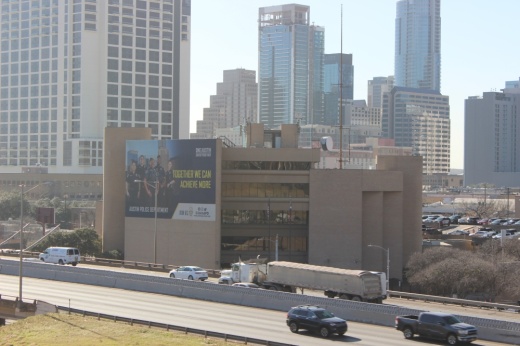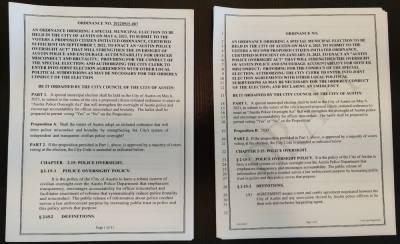Despite many differences in content, the proposals feature similar language throughout and would each enact what they call an "Austin Police Oversight Act." The first was drafted by the criminal justice political group Equity Action and validated by the city last September. The second petition campaign was backed by Voters for Oversight and Police Accountability, a political committee funded almost entirely by the Austin Police Association, and validated early this month.
Both center on policy and operations at the Austin Police Department and the powers of the city's Office of Police Oversight, or OPO, and civilian Community Police Review Commission, or CPRC.
Equity Action's oversight act will be labeled as Proposition A on Austinites' ballots, while the VOPA act is set to be Proposition B.
The backstory
In Austin, citizen-proposed initiatives supported by the lesser of 20,000 voters or 5% of the voter pool must either be approved outright by City Council or decided in a civic election. City Clerk Myrna Rios said the second petition from VOPA, submitted to the city in mid-December, surpassed that threshold based on statistical analysis. That sampling estimated just over 22,000 signatures of the 37,113 on the petition were valid.
The update comes several months after the first petition from Equity Action was validated through the same process and council deferred to voters on the proposal. Officials are scheduled to consider adding the VOPA measure to the May 6 local election during their Feb. 9 meeting.
VOPA has come under scrutiny from residents, elected officials and Equity Action representatives who reported on petition canvassers obscuring the intent of the measure and lying about its contents and the organization they worked for.
District 8 Council Member Paige Ellis shared one encounter with a VOPA canvasser who she said had claimed to be promoting Equity Action’s petition before later identifying himself as part of the police-backed effort. Equity Action also campaigned against what it has called the “imposter” petition and shared multiple recordings of canvassers falsely identifying themselves and their oversight act's objectives.
"By pretending to be with Equity Action, and copying the name, caption and format of our measure to try and sneak their proposal on the May ballot, those involved have shown that they know their effort can't stand on its own merits, so their only chance was to try and stand on ours," said Chris Harris, Equity Action board president, in a December statement.
Confusion or concern over the petition process may have led hundreds of people to retract their support after initially signing onto the VOPA campaign. The city clerk's office reported a total of 633 signature withdrawal forms prior to validation; 461 were removed from the final petition.
VOPA campaign treasurer James Wood and the APA did not respond to requests for comment as of press time. On VOPA's website, the group stated its proposal is aimed at APD transparency and accountability, and protecting officers' due process rights.
Dig deeper
Aside from identical titles and captions, the Equity Action and VOPA proposals share many similarities but would not accomplish the same results. Changes made between Proposition A and Proposition B would limit the powers of the OPO and CPRC and reduce access to some information by those entities or the public.
Compared to Equity Action's original petition, some changes in the VOPA version of the measure include:
- Eliminating language about APD's commitment to addressing officer misconduct and police brutality;
- Removing language allowing for anonymous feedback and the investigation of police officers in the OPO's duties;
- Banning CPRC membership based on being charged with Class A or Class B misdemeanors or convicted or indicted for felonies;
- Removing a requirement for the police chief to provide written responses to all OPO reports and CPRC proposals and disciplinary recommendations;
- Creating new language to continue Austin's practice of keeping classified "g-files," or personnel records detailing officer conduct, as allowed under state law; and
- Removing language that would prevent City Council from adopting a new police contract if that agreement allows police officers to file grievances, or if that agreement conflicts with the new oversight act.
The draft ordinance for Proposition B, backed by VOPA, may be viewed here.
A comparison of Proposition B's adjustments to the original Proposition A as produced by Equity Action may be viewed below.






